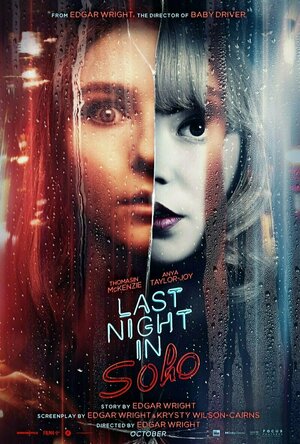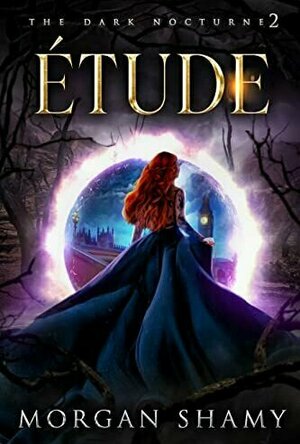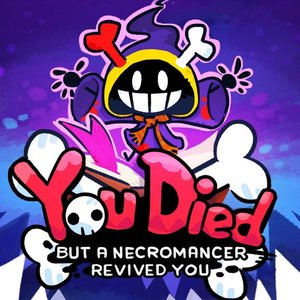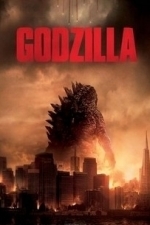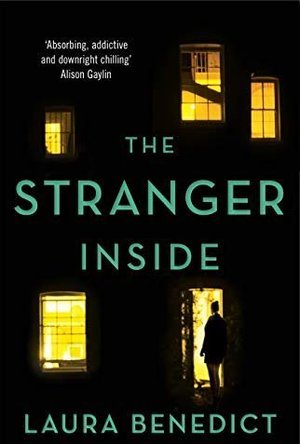Search
Search results
BankofMarquis (1832 KP) rated Last Night in Soho (2021) in Movies
Nov 5, 2021
Unique
Writer/Director Edgar Wright has developed into one of the more unique film makers working today with a stylistic look, feel and sound to all of his films. Long known as the Director of the Simon Pegg/Nick Frost comedies (SHAUN OF THE DEAD, HOT FUZZ and AT WORLD’S EDGE), Wright started coming into his own with the under-rated SCOTT PILGRIM vs. THE WORLD and the marvelous BABY DRIVER and with his latest film, the trippy thriller LAST NIGHT IN SOHO, Wright has graduated - in my eyes - as a Director who’s work is “must watch” whenever they come out.
LAST NIGHT IN SOHO is unique, stylized, stunning - both visually and aurally - mind-bending, tense and satisfying. A truly unique film by a unique filmmaker.
To tell the tale of LAST NIGHT IN SOHO is to spoil it. The less you know about it, the better. But, as the trailers suggest, a modern young fashion student is in London and is transported into the “swinging ‘60’s London and ends up living, vicariously, the life of another. That’s all I’ll say. I would recommend just going in and let the story wash all over you - both through the eyes and through the ears - which is why I would recommend this film been seen in a theater (or, at the very least, on a set-up with a killer sound system).
Because of the highly stylized and “go with it” feel of this film, the performances have a tendency to move to the background, but they are very well done. Thomasin McKenzie (JOJO RABBIT) is a strong choice as the Fashion Student who has this “adventure” (to say more is to spoil), she brings the right amount of reality and “unreality” to her character. Anya Taylor-Joy (THE QUEEN’S GAMBIT) is superb as Sandie, the object of the “adventure”. She isn’t asked to do much more than be mysterious - and she does it well.
Wright, wisely, fills the rest of the film with strong supporting players - Matt Smith (DR. WHO), the great Terence Stamp (THE LIMEY) and, most importantly, Dame Diana Rigg (Emma Peel in THE AVENGERS in the 1960’s, in her final film role before her death in September 2020), all bring their “A” game to the festivities and fill their roles well.
It’s not a perfect film, the beginning drags on a bit before things start to get good (and weird) and their is a superfluous subplot involving some “Mean Girls” at the Fashion School that our heroine attends in today’s world - a subplot that never really goes anywhere. The ending, also, does go “over the top”, but by that time, I was swept up in the style of this film and forgave it it’s flaws.
I ended up having LAST NIGHT IN SOHO-type dreams, and indication that this film struck a chord with me and is going to stay with me for awhile - and is probably worth a re-watch (it certainly is one of those types of films that can be different upon a re-watch).
Well worth the effort to check it out on the Big Screen - certainly the visuals and sound will make it worthwhile.
Letter Grade: A-
8 stars (out of 10) and you can take that to the Bank(ofMarquis)
LAST NIGHT IN SOHO is unique, stylized, stunning - both visually and aurally - mind-bending, tense and satisfying. A truly unique film by a unique filmmaker.
To tell the tale of LAST NIGHT IN SOHO is to spoil it. The less you know about it, the better. But, as the trailers suggest, a modern young fashion student is in London and is transported into the “swinging ‘60’s London and ends up living, vicariously, the life of another. That’s all I’ll say. I would recommend just going in and let the story wash all over you - both through the eyes and through the ears - which is why I would recommend this film been seen in a theater (or, at the very least, on a set-up with a killer sound system).
Because of the highly stylized and “go with it” feel of this film, the performances have a tendency to move to the background, but they are very well done. Thomasin McKenzie (JOJO RABBIT) is a strong choice as the Fashion Student who has this “adventure” (to say more is to spoil), she brings the right amount of reality and “unreality” to her character. Anya Taylor-Joy (THE QUEEN’S GAMBIT) is superb as Sandie, the object of the “adventure”. She isn’t asked to do much more than be mysterious - and she does it well.
Wright, wisely, fills the rest of the film with strong supporting players - Matt Smith (DR. WHO), the great Terence Stamp (THE LIMEY) and, most importantly, Dame Diana Rigg (Emma Peel in THE AVENGERS in the 1960’s, in her final film role before her death in September 2020), all bring their “A” game to the festivities and fill their roles well.
It’s not a perfect film, the beginning drags on a bit before things start to get good (and weird) and their is a superfluous subplot involving some “Mean Girls” at the Fashion School that our heroine attends in today’s world - a subplot that never really goes anywhere. The ending, also, does go “over the top”, but by that time, I was swept up in the style of this film and forgave it it’s flaws.
I ended up having LAST NIGHT IN SOHO-type dreams, and indication that this film struck a chord with me and is going to stay with me for awhile - and is probably worth a re-watch (it certainly is one of those types of films that can be different upon a re-watch).
Well worth the effort to check it out on the Big Screen - certainly the visuals and sound will make it worthwhile.
Letter Grade: A-
8 stars (out of 10) and you can take that to the Bank(ofMarquis)
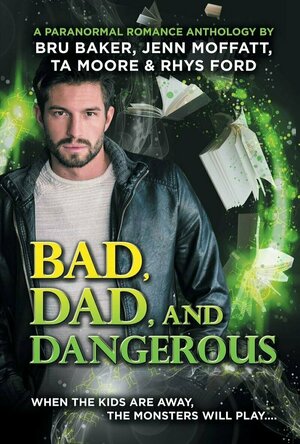
Bad, Dad, And Dangerous Anthology
Rhys Ford, TA Moore, Bru Baker and Jenn Moffatt
Book
Bad, Dad, and Dangerous Anthology When the kids are away, the monsters will play. School’s out...
Paranormal Romance MM MF
Heather Cranmer (2721 KP) rated Etude (The Dark Nocturne #2) in Books
Aug 15, 2022
After reading and loving Serenade, the first book in The Dark Nocturne series by Morgan Shamy, I automatically started the second book in the series, Etude, right away. Morgan Shamy proved, yet again, that she's making the paranormal fantasy genre her own with this book!
In Etude, November has been away from St. Paul's Academy for a month. She wants nothing to do with the school or anyone from the school after what happened in Serenade. When kids start falling into comas, she thinks she may be the cause thanks to Vincent. Reluctantly, she returns to the school to try to save the day. However, bad things start happening (again) to November and her friends.
Just like with the plot of Serenade, Etude's plot is very original. I have never read anything like it, and that's a good thing! It is refreshing to read something original in a given genre especially when all previous books you've read in that genre start sounding the same. Anyway, I will admit that the plot of Etude does start off a bit slow. However, about sixty percent or so into the book, the pacing definitely picks up. I couldn't put the book down after that! I had suspicions about who would be the bad people and who were the good all throughout this book. I had to keep reading to see if I was right and to find out what would happen between Vincent and November. I loved the introduction of the dream world in Etude as well. With witches and blood walkers (vampires) roaming around in the novel, the action was there all throughout the book! Two plot twists were easy for me to figure out, but there were a couple of more plot twists (including a major one), that I just didn't see coming! Turns out that you really never know who you can trust in the Dark Nocturne universe. The book does end on a minor cliff hanger.
The characters in Etude are just as fleshed out and well developed as before. (I would even go as far as to say they're even more developed in this book than in the first in the series, and they were fleshed out well in that story.) While November is written well, I found her annoying in Etude. I don't know if it's because I'm about 20 years older than her, so I have more wisdom, but I found her lack of telling people about suspicious people and not trusting those around her more a bit infuriating. The fact that she would trust a stranger over her friends and not tell them when said stranger shares something major that could end up harming everyone really infuriated me. I wanted to bang my head against a brick wall! I kept screaming at November (in my head) to just tell someone about the suspicious character and what they would do to her (and to others). Yet November just seemed to let it slide until it becomes too late. I wish Vincent was in the story more because I loved Vincent in Serenade, but I know why he's not around as much in Etude. Cam was more more likeable in this book, and I loved how he seemed to be a better friend to everyone in Etude. Margaret was also really sweet in this book, and I think she ended up being my favorite character even if she wasn't featured a lot throughout the novel. Marcus was written well, but I always had my reservations about him. He seemed very selfish throughout the book (even if he said he wanted to help save his sisters). I also really liked Deva, although she was another character that wasn't featured that much in Etude. Be sure not to get attached to any one character though because Morgan Shamy is not afraid of killing anyone off (like in the first book)! That's another think I love about this series.
Trigger warnings for Etude include violence, death, murder, and mind control.
All in all, Etude is a fantastic follow up to the very well written Serenade. If you like figuring out which characters are the baddies, a plot that will consume you, and being whisked off to a magical world, then Etude is for you. I would definitely recommend Etude by Morgan Shamy to those aged 14+ who love an original take on paranormal fantasy where character loyalties aren't always as they seem. As for me, I've already started reading Promenade, the third book in the series because I'm addicted!
In Etude, November has been away from St. Paul's Academy for a month. She wants nothing to do with the school or anyone from the school after what happened in Serenade. When kids start falling into comas, she thinks she may be the cause thanks to Vincent. Reluctantly, she returns to the school to try to save the day. However, bad things start happening (again) to November and her friends.
Just like with the plot of Serenade, Etude's plot is very original. I have never read anything like it, and that's a good thing! It is refreshing to read something original in a given genre especially when all previous books you've read in that genre start sounding the same. Anyway, I will admit that the plot of Etude does start off a bit slow. However, about sixty percent or so into the book, the pacing definitely picks up. I couldn't put the book down after that! I had suspicions about who would be the bad people and who were the good all throughout this book. I had to keep reading to see if I was right and to find out what would happen between Vincent and November. I loved the introduction of the dream world in Etude as well. With witches and blood walkers (vampires) roaming around in the novel, the action was there all throughout the book! Two plot twists were easy for me to figure out, but there were a couple of more plot twists (including a major one), that I just didn't see coming! Turns out that you really never know who you can trust in the Dark Nocturne universe. The book does end on a minor cliff hanger.
The characters in Etude are just as fleshed out and well developed as before. (I would even go as far as to say they're even more developed in this book than in the first in the series, and they were fleshed out well in that story.) While November is written well, I found her annoying in Etude. I don't know if it's because I'm about 20 years older than her, so I have more wisdom, but I found her lack of telling people about suspicious people and not trusting those around her more a bit infuriating. The fact that she would trust a stranger over her friends and not tell them when said stranger shares something major that could end up harming everyone really infuriated me. I wanted to bang my head against a brick wall! I kept screaming at November (in my head) to just tell someone about the suspicious character and what they would do to her (and to others). Yet November just seemed to let it slide until it becomes too late. I wish Vincent was in the story more because I loved Vincent in Serenade, but I know why he's not around as much in Etude. Cam was more more likeable in this book, and I loved how he seemed to be a better friend to everyone in Etude. Margaret was also really sweet in this book, and I think she ended up being my favorite character even if she wasn't featured a lot throughout the novel. Marcus was written well, but I always had my reservations about him. He seemed very selfish throughout the book (even if he said he wanted to help save his sisters). I also really liked Deva, although she was another character that wasn't featured that much in Etude. Be sure not to get attached to any one character though because Morgan Shamy is not afraid of killing anyone off (like in the first book)! That's another think I love about this series.
Trigger warnings for Etude include violence, death, murder, and mind control.
All in all, Etude is a fantastic follow up to the very well written Serenade. If you like figuring out which characters are the baddies, a plot that will consume you, and being whisked off to a magical world, then Etude is for you. I would definitely recommend Etude by Morgan Shamy to those aged 14+ who love an original take on paranormal fantasy where character loyalties aren't always as they seem. As for me, I've already started reading Promenade, the third book in the series because I'm addicted!
Connor Sheffield (293 KP) rated You Died, But a Necromancer Revived You in Video Games
Apr 19, 2019
Fast Paced Action (5 more)
Ever changing maps
Traps that make you think
Great art design
Great level design
Simple gameplay
Let Me Die!
You Died but a Necromancer Revived You......but you'll wish you had just stayed dead as you face the same levels over and over and over again. Speed and Accuracy are mandatory.
This game is so simple with no other controls to worry about other than your movement using the analog stick, or the D-Pads. The skill to get through the levels however becomes increasingly more difficult, and rapidly more frustrating as you will die.....over and over and over again, only to either respawn at the first level, or if you play on easy mode, you just have to play that same floor again where you just died, but don't bother memorising the traps placements, cos this game doesn't let you off the hook that easily....the maps change even when your playing the same floor you just died on.
Part of you might think at first, I'll wait for the trap to go before I move, but oh no, once again speed and accuracy are key here, you have to time your runs right, get through the traps, try not to get shot, stabbed, squashed, or even more so....try not to run off the edge into a floor full of spikes....it's not as easy to avoid as you might think, one small step in the wrong direction of those floors and you're gone.
This game is addictive, but so utterly frustrating and I had a good laugh on my own the first 100 times I died but I can imagine that with 3 other players on the board in 4-Player Co-Op mode, it will leave you in stitches (hopefully not literally....leave that to your character to injure themselves).
Difficulty levels I have seen this far are simply Easy, or Normal. I don't know if a hard difficulty unlocks after complete the game, because honestly at the minute....I can't complete it. The levels where you face the Necromancer himself are super frustrating and very difficult to do without messing up again and again. However, don't thin easy level makes the traps etc any easier....all it does is simply keep you on the floor you died (unless its a boss battle). The difficulty level of the traps does not change and in Normal mode, if you die, you go right back to the beginning of the level, but luckily there are checkpoints along the way so you don't start from square one again.
Oh and did I mention that as time goes on, the floor eventually starts blowing up behind you, making you rush through to the end.
There are a variety of awesome 8-bit characters to choose from, which gives this whole game a great nostalgic vibe of playing retro games, but with so much added in that it stills feels modern and definitely a game you'll keep going back to. Especially for a game night with friends.
I highly recommend this game for anyone who's a fan of action packed arcade games with a retro feel.
Just try not to throw the remote.
This game is so simple with no other controls to worry about other than your movement using the analog stick, or the D-Pads. The skill to get through the levels however becomes increasingly more difficult, and rapidly more frustrating as you will die.....over and over and over again, only to either respawn at the first level, or if you play on easy mode, you just have to play that same floor again where you just died, but don't bother memorising the traps placements, cos this game doesn't let you off the hook that easily....the maps change even when your playing the same floor you just died on.
Part of you might think at first, I'll wait for the trap to go before I move, but oh no, once again speed and accuracy are key here, you have to time your runs right, get through the traps, try not to get shot, stabbed, squashed, or even more so....try not to run off the edge into a floor full of spikes....it's not as easy to avoid as you might think, one small step in the wrong direction of those floors and you're gone.
This game is addictive, but so utterly frustrating and I had a good laugh on my own the first 100 times I died but I can imagine that with 3 other players on the board in 4-Player Co-Op mode, it will leave you in stitches (hopefully not literally....leave that to your character to injure themselves).
Difficulty levels I have seen this far are simply Easy, or Normal. I don't know if a hard difficulty unlocks after complete the game, because honestly at the minute....I can't complete it. The levels where you face the Necromancer himself are super frustrating and very difficult to do without messing up again and again. However, don't thin easy level makes the traps etc any easier....all it does is simply keep you on the floor you died (unless its a boss battle). The difficulty level of the traps does not change and in Normal mode, if you die, you go right back to the beginning of the level, but luckily there are checkpoints along the way so you don't start from square one again.
Oh and did I mention that as time goes on, the floor eventually starts blowing up behind you, making you rush through to the end.
There are a variety of awesome 8-bit characters to choose from, which gives this whole game a great nostalgic vibe of playing retro games, but with so much added in that it stills feels modern and definitely a game you'll keep going back to. Especially for a game night with friends.
I highly recommend this game for anyone who's a fan of action packed arcade games with a retro feel.
Just try not to throw the remote.
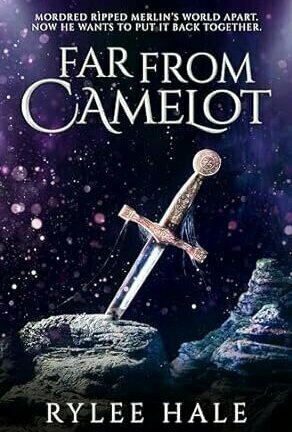
Far From Camelot (Far From #2)
Book
Merlin The Kingdom of Camelot did not fall with the death of King Arthur. But I did. I fled to...
MM Fantasy Romance
Ryan Hill (152 KP) rated Godzilla (2014) in Movies
Jun 28, 2019
"let them fight"
This film is an absolute masterpiece. Not once did I find myself getting bored or losing track of the plot - something that happens commonly when I watch longer movies - and I was gutted when it was over. Not because I was disappointed, but because I desperately wanted more. Gareth Edwards' film takes monster movies to a whole new level, with some nice twists to the usual "Godzilla" story lines, a fantastic cast and some of the best action sequences I have ever had the pleasure of seeing.
The first thing to mention about this film is its cast and its focus on the human characters, played mainly by Aaron Taylor-Johnson (Lieutenant Ford Brody), Elizabeth Olsen (Elle Brody, Ford's wife), and Bryan Cranston (Joe Brody, Ford's estranged father). Bryan Cranston is only really in the first half, portraying his character as a very outcast, yet very determined former nuclear engineer who is searching for the truth about his wife's tragic death. He was fantastic in the role delivering each line with emotion and conviction he was the best character in the film and I wish he was in the film longer. His theories beautifully foreshadow the events to come, and he drags his son, Ford, right into the heart of the trouble. Thankfully, this means that we get to see lots of the brilliant Aaron Taylor- Johnson, a courageous explosive ordnance disposal technician who comes face-to-face with Godzilla several times. Literally. Aaron Taylor-Johnson really is the star here, and the scenes with his wife, Elle, and son, Sam, before any of the action starts makes his actions later on all the more respectable and courageous as he risks his life to save them and the entire city. Elizabeth Olsen isn't used as much as I would have liked, as she is fantastic in the scenes in which we see her. Having said that, she does appear a fair amount, as the strong wife and mother holding back her terror in order to stay and help. Her scenes with Aaron Taylor- Johnson are great too, and make for some very believable characters. The other main character is Dr Serizawa (played by Ken Watanabe), a scientist monitoring Godzilla and the MUTOs. He doesn't really do much apart from look very worried in every shot and say tense or shocking one-liners, but Ken Watanabe makes sure that it's never cringe-worthy or boring.
Secondly we have Gareth Edwards' directing - wow! I need to see more of this guy! Every shot looks as good as it could possibly be, and the first reveal of Godzilla is brilliant. There's a MUTO smashing up an airport. Cue plane exploding, followed by the one to the right, and then the one to the right, and then… a foot. Silence. Another foot. Cut to a shot of the MUTO roaring, and then back to the feet. Up the camera pans (for quite a long time!), leaving us with a beautiful high-angle shot of the beast himself. And then comes the roar. There's another great shot of Godzilla making his way across the Pacific to San Francisco, and another in the city itself of… well, there's no other way of putting it – Godzilla and a MUTO having a good old' fashioned fistfight, which culminates in a pretty fantastic and well-timed tail slam from the big guy. The skyscrapers don't really bother them. It's just a long shot, and in it we see two giant monsters ripping each other to shreds and obliviously destroying the city below. Another great shot (or shots) is during the HALO jump, as we see the city in flames, the men falling through the clouds and the burning skyline and a close-up of a Godzilla vs MUTO fight.
Now I'll move on to the plot and the headline acts – the MUTOs and the big guy himself, Godzilla. The plot is very straightforward. A MUTO hatches in Japan, one hatches in Nevada next to Las Vegas, and this is all because they've been feeding on humanity's nuclear waste and radiation. Oh, and by the way, the MUTOs look brilliant. Imagine a metal praying mantis crossed with a four-legged spider, as tall as a skyscraper. That's a MUTO. Anyway, Ford joins the fight to stop the creatures, and as they make their way to San Francisco the military plan to destroy them with their most powerful nuclear weapon. Godzilla is closing in too, and when the pesky MUTOs steal the nuke and build their nest around it, Ford and a group of soldiers must go into the city to detonate it. However, Godzilla and the MUTOs are also in the city, smashing everything (including each other) to bits. It's very odd that, for once, we end up cheering Godzilla on, as the two MUTOs begin to overwhelm him as he is seemingly hurt. And then he is actually made out to be the good guy (a twist I enjoyed), as he saves Ford in a spectacular way from a MUTO and the media call him " the saviour of our city?". 'Zilla looks amazing too. "Massive" is probably an understatement, but the spikes on his back, the battle scars on his body and his terrifying face make him look awesome. Also, his roar had me jumping up and down with excitement, as did his surprise for the MUTOs: his atomic fire breath.
All in all, "Godzilla" is one fantastic movie. No longer a mockery, but terrifying, tense, and, unlike many monster movies, it is complex. Complex in that it has multiple characters with interesting back-stories (that are all explored) and gives Godzilla a new personality and purpose. Everything looks great, it feels epic, and I enjoyed every moment. This is a movie that would appeal to anyone.
The first thing to mention about this film is its cast and its focus on the human characters, played mainly by Aaron Taylor-Johnson (Lieutenant Ford Brody), Elizabeth Olsen (Elle Brody, Ford's wife), and Bryan Cranston (Joe Brody, Ford's estranged father). Bryan Cranston is only really in the first half, portraying his character as a very outcast, yet very determined former nuclear engineer who is searching for the truth about his wife's tragic death. He was fantastic in the role delivering each line with emotion and conviction he was the best character in the film and I wish he was in the film longer. His theories beautifully foreshadow the events to come, and he drags his son, Ford, right into the heart of the trouble. Thankfully, this means that we get to see lots of the brilliant Aaron Taylor- Johnson, a courageous explosive ordnance disposal technician who comes face-to-face with Godzilla several times. Literally. Aaron Taylor-Johnson really is the star here, and the scenes with his wife, Elle, and son, Sam, before any of the action starts makes his actions later on all the more respectable and courageous as he risks his life to save them and the entire city. Elizabeth Olsen isn't used as much as I would have liked, as she is fantastic in the scenes in which we see her. Having said that, she does appear a fair amount, as the strong wife and mother holding back her terror in order to stay and help. Her scenes with Aaron Taylor- Johnson are great too, and make for some very believable characters. The other main character is Dr Serizawa (played by Ken Watanabe), a scientist monitoring Godzilla and the MUTOs. He doesn't really do much apart from look very worried in every shot and say tense or shocking one-liners, but Ken Watanabe makes sure that it's never cringe-worthy or boring.
Secondly we have Gareth Edwards' directing - wow! I need to see more of this guy! Every shot looks as good as it could possibly be, and the first reveal of Godzilla is brilliant. There's a MUTO smashing up an airport. Cue plane exploding, followed by the one to the right, and then the one to the right, and then… a foot. Silence. Another foot. Cut to a shot of the MUTO roaring, and then back to the feet. Up the camera pans (for quite a long time!), leaving us with a beautiful high-angle shot of the beast himself. And then comes the roar. There's another great shot of Godzilla making his way across the Pacific to San Francisco, and another in the city itself of… well, there's no other way of putting it – Godzilla and a MUTO having a good old' fashioned fistfight, which culminates in a pretty fantastic and well-timed tail slam from the big guy. The skyscrapers don't really bother them. It's just a long shot, and in it we see two giant monsters ripping each other to shreds and obliviously destroying the city below. Another great shot (or shots) is during the HALO jump, as we see the city in flames, the men falling through the clouds and the burning skyline and a close-up of a Godzilla vs MUTO fight.
Now I'll move on to the plot and the headline acts – the MUTOs and the big guy himself, Godzilla. The plot is very straightforward. A MUTO hatches in Japan, one hatches in Nevada next to Las Vegas, and this is all because they've been feeding on humanity's nuclear waste and radiation. Oh, and by the way, the MUTOs look brilliant. Imagine a metal praying mantis crossed with a four-legged spider, as tall as a skyscraper. That's a MUTO. Anyway, Ford joins the fight to stop the creatures, and as they make their way to San Francisco the military plan to destroy them with their most powerful nuclear weapon. Godzilla is closing in too, and when the pesky MUTOs steal the nuke and build their nest around it, Ford and a group of soldiers must go into the city to detonate it. However, Godzilla and the MUTOs are also in the city, smashing everything (including each other) to bits. It's very odd that, for once, we end up cheering Godzilla on, as the two MUTOs begin to overwhelm him as he is seemingly hurt. And then he is actually made out to be the good guy (a twist I enjoyed), as he saves Ford in a spectacular way from a MUTO and the media call him " the saviour of our city?". 'Zilla looks amazing too. "Massive" is probably an understatement, but the spikes on his back, the battle scars on his body and his terrifying face make him look awesome. Also, his roar had me jumping up and down with excitement, as did his surprise for the MUTOs: his atomic fire breath.
All in all, "Godzilla" is one fantastic movie. No longer a mockery, but terrifying, tense, and, unlike many monster movies, it is complex. Complex in that it has multiple characters with interesting back-stories (that are all explored) and gives Godzilla a new personality and purpose. Everything looks great, it feels epic, and I enjoyed every moment. This is a movie that would appeal to anyone.
Billie Wichkan (118 KP) rated The Stranger Inside in Books
May 22, 2019
Kimber Hannon's belief that she has complete control over her life is shattered the night that she comes home from a trip to find her key no longer opens her front door. There is a stranger living in her house. A stranger who claims he has every right to be there, with the paperwork to prove it. When she confronts the man, he lets her get close enough to whisper, "I was there. I saw what you did."
She doesn't know how he knows her, but with those words Kimber knows this stranger isn't after anything as simple as her money or artwork or charming Craftsman bungalow. She has to find out exactly what he wants and get him out of her carefully orchestrated life before he ruins it.
There are plenty of people in her life who might help, but should Kimber trust any of them? Her lawyer, Gabriel, is also her ex-lover; Diana, her best friend, doesn't know Kimber slept with her husband; her ex-husband has a new, happier life since leaving her; and her co-workers know she'll do anything to get her next sale. And no one can know the real reason this man is in her house. Without trust, everyone's a stranger....
This is a psychological thriller that has plenty of twists and secrets. This book manages to grip you from the very start and doesn't let you go. There are plenty of plots and twists to keep you guessing all the way to the end.
The story is fast paced and well developed characters. The ending of the story will blow your mind.
The plot switches between the two timelines of the past and present and as it does you will learn of secrets and lies.
If you are looking for a suspenseful read then this is the one for you.
Highly Recommend!!
Thank you to NetGalley, Hodder and Stoughton and the author for my free digital ARC.
She doesn't know how he knows her, but with those words Kimber knows this stranger isn't after anything as simple as her money or artwork or charming Craftsman bungalow. She has to find out exactly what he wants and get him out of her carefully orchestrated life before he ruins it.
There are plenty of people in her life who might help, but should Kimber trust any of them? Her lawyer, Gabriel, is also her ex-lover; Diana, her best friend, doesn't know Kimber slept with her husband; her ex-husband has a new, happier life since leaving her; and her co-workers know she'll do anything to get her next sale. And no one can know the real reason this man is in her house. Without trust, everyone's a stranger....
This is a psychological thriller that has plenty of twists and secrets. This book manages to grip you from the very start and doesn't let you go. There are plenty of plots and twists to keep you guessing all the way to the end.
The story is fast paced and well developed characters. The ending of the story will blow your mind.
The plot switches between the two timelines of the past and present and as it does you will learn of secrets and lies.
If you are looking for a suspenseful read then this is the one for you.
Highly Recommend!!
Thank you to NetGalley, Hodder and Stoughton and the author for my free digital ARC.
BookwormMama14 (18 KP) rated Dance Over Me in Books
Jan 2, 2019
Well, my first thought...is that I NEED to see 42nd Street! As a lover of all things theatre, I can't believe that I haven't seen it yet. Speaking of theatre, I simply adored all the stage talk in this book! It has been so long since I have been on the stage, but I felt like I was right there with Dani. The pre-show nerves, the excitement and thrill of a live audience, the relief when the final curtain falls. But OH...Drama, drama, drama!!! Unfortunately, the theatre world can be brutal and harsh (thankfully not MY experience), and Candee did a wonderful job of portraying that, even if it did make me want to go out and purse whomp some people. (Thank you Reading is my SuperPower for the inspiration.) The romance is clean and oh, so sweet. Candee built the suspense perfectly, and Alex is such a gentleman! I too, am a dancer, and I found Dani's expression of her heart through dance bringing me to tears. It has been too long since I have danced, since I have truly expressed myself in the arts, and too long since I have let my Heavenly Father dance over me. (This is something that will hopefully be remedied before too long.) Dani's story is a good reminder to trust the Lord to fight our battles for us. While I do think we need to stand up for ourselves, it is not our place to fight for revenge. And through all of this, Dani was trying to kick down doors to find her brother, when all along the Lord was simply wanting her to trust Him to open the doors. You will just have to read the book to see if she walks through the doors He opens...Dance Over Me is written strictly from Dani's viewpoint, in third person. I found that it made the story very easy to follow and truly let me live inside Dani's brain. Dance Over Me had me on the edge of my seat for the whole TWO days that it took me to read this book, it is THAT good. Beautifully written and a captivating storyline, you definitely do not want to miss this one.
I received a free copy of Dance Over Me from the author in exchange for my honest review. All opinions expressed are mine alone.
I received a free copy of Dance Over Me from the author in exchange for my honest review. All opinions expressed are mine alone.
Lyndsey Gollogly (2893 KP) rated Ash (Hive Trilogy, #1) in Books
Aug 1, 2022
136 of 230
Kindle
Ash ( Hive Trilogy book 1)
By Jaymin Eve and Leia Stone
⭐️⭐️⭐️⭐️
Are you an Ash?
*Increased stamina
*Lack of appetite
*Anger outbursts
*Insatiable thirst
*Beauty & Strength
*Male
Call the hotline if these symptoms come on suddenly!
Turns out Charlie Bennet was all of those things except the last. Don’t let the name fool you, Charlie was all woman and she wanted nothing to do with the ash … until the day she found out she was one.
It all started when infected bats bit a small group of humans and created what are now called vampires. Then, the male vampires knocked up some female humans and the result was a gorgeous race of all male ash. Superhuman freaks that had looks to kill.
Charlie is the first female ash, aka unicorn of the Hive – the gated compound in Portland that the humans have designated to isolate vampires and ash from society.
Problem? The Hive is full and only a select few will be allowed to live there. To live at all, really. If Charlie wants to earn the right to become a citizen of the Hive, she will have to survive the culling – a series of fights to the death. And guess what? Just because she’s a girl doesn’t mean she’ll get special treatment.
Good thing there’s Ryder, the mysterious lead ash enforcer, who seems to always have her back. But when secrets bubble to the surface, it will take more than one guy to save her.
I really liked this! It was a different take on vampires and their origins and I thought it was so clever. The characters were likeable and you had that will they won’t they attraction between the main characters. If I had one thing that slightly drove me crazy was being told how hot it sexy they were every 4 or so pages yes we get that they are beautiful, sexy and hot guys please stop telling me 😂. I’m definitely looking forward to seeing where they take this storyline.
Kindle
Ash ( Hive Trilogy book 1)
By Jaymin Eve and Leia Stone
⭐️⭐️⭐️⭐️
Are you an Ash?
*Increased stamina
*Lack of appetite
*Anger outbursts
*Insatiable thirst
*Beauty & Strength
*Male
Call the hotline if these symptoms come on suddenly!
Turns out Charlie Bennet was all of those things except the last. Don’t let the name fool you, Charlie was all woman and she wanted nothing to do with the ash … until the day she found out she was one.
It all started when infected bats bit a small group of humans and created what are now called vampires. Then, the male vampires knocked up some female humans and the result was a gorgeous race of all male ash. Superhuman freaks that had looks to kill.
Charlie is the first female ash, aka unicorn of the Hive – the gated compound in Portland that the humans have designated to isolate vampires and ash from society.
Problem? The Hive is full and only a select few will be allowed to live there. To live at all, really. If Charlie wants to earn the right to become a citizen of the Hive, she will have to survive the culling – a series of fights to the death. And guess what? Just because she’s a girl doesn’t mean she’ll get special treatment.
Good thing there’s Ryder, the mysterious lead ash enforcer, who seems to always have her back. But when secrets bubble to the surface, it will take more than one guy to save her.
I really liked this! It was a different take on vampires and their origins and I thought it was so clever. The characters were likeable and you had that will they won’t they attraction between the main characters. If I had one thing that slightly drove me crazy was being told how hot it sexy they were every 4 or so pages yes we get that they are beautiful, sexy and hot guys please stop telling me 😂. I’m definitely looking forward to seeing where they take this storyline.
